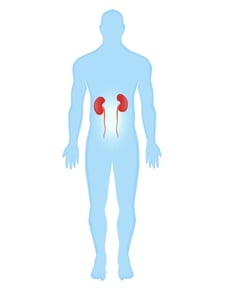 The kidneys are remarkable multi-function organs that play a critical role in regulating blood glucose levels. However, when glucose levels are too high, the kidneys can sustain damage, reducing their ability to filter glucose out of the blood stream. The relationship between diabetes and your kidneys can either be really good, or really bad... resulting in a love-hate kind of connection.
The kidneys are remarkable multi-function organs that play a critical role in regulating blood glucose levels. However, when glucose levels are too high, the kidneys can sustain damage, reducing their ability to filter glucose out of the blood stream. The relationship between diabetes and your kidneys can either be really good, or really bad... resulting in a love-hate kind of connection.
Kidney problems from diabetes can start out small and stay that way for years. In time, however, it can escalate and end in renal failure. Managing blood glucose levels is critical for maintaining healthy kidneys in diabetics.
The Love: In Normal Circumstances
The human body naturally breaks food down into its basic components during the digestion process. Glucose is one of those components. It gets absorbed into the bloodstream by the small intestine and flows through the blood stream, being picked up by the body's cells to use for energy. Any extra glucose then travels through the blood stream and into the kidneys.
In someone with normal kidney function, the kidneys filter out the unused glucose molecules. That filtered glucose then goes into another part of the kidney, known as the proximal convoluted tubule, where it gets reabsorbed into the blood stream.
Under normal circumstances, the kidneys can reabsorb about 300 mg of glucose each minute. If glucose levels rise above that level, the excess gets expelled into the urine stream. An occasional spike of glucose is perfectly normal and the body will go back to normal functioning once glucose levels go back down. In someone with diabetes, however, those glucose levels may not be going down.
The Hate: Consistent High Glucose Causes Damage
One of the functions of your kidneys is to maintain the proper concentration of fluids in the body. When blood glucose levels start rising, and don't come down, it triggers a process known as diuresis. This process causes the kidneys to start absorbing water to increase urine levels. The increased volume of fluid stresses the microscopic blood vessels, which act as waste filters. Eventually this stress can cause protein, which does not normally get filtered by the kidneys, to leak through the filters into the urine stream.
Excess glucose also triggers certain chemical reactions which can damage the delicate structures within the kidneys. This can put further stress on the kidneys. Over time, if glucose levels remain high, the damage to the kidneys can continue to increase. The kidney's ability to do its job decreases.
Kidney problems from diabetes can cause a number of symptoms:
- Ankle swelling
- High blood pressure
- Frequent nighttime urination
- Nausea/vomiting
- Anemia
- Less need for diabetic medications
What Can a Diabetic Do?
To prevent kidney problems from diabetes, diabetics need to take proactive action.
- Check A1C levels at least two times per year. It should come in at 7.0 or below.
- Manage blood glucose levels with medications and insulin, as recommended by the doctor.
- Check blood pressure levels at least once every month or two.
- Take a urine test at least once a year to measure protein levels being excreted by the kidneys.
The number of people developing diabetes continues to grow. This puts more and more people at risk of developing kidney problems and requires diabetics to take special care in managing their blood glucose levels.





